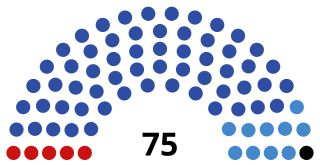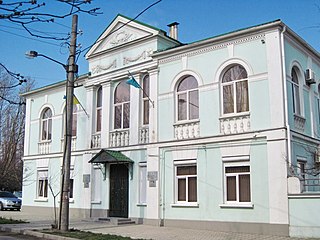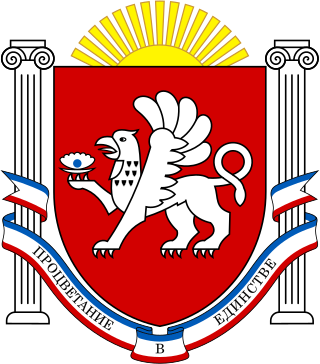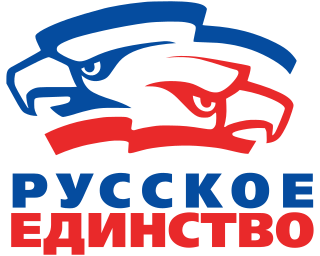
The Party of Regions is a banned pro-Russian political party in Ukraine formed in late 1997 that became the largest party in Ukraine between 2006 and 2014.

The State Council of Crimea is the parliament of the Russia-administered Republic of Crimea. It claims to be a continuation of the 'Supreme Council of Crimea' following a vote by the Ukrainian parliament to dissolve the Supreme Council of Crimea. The Parliament is housed in the Parliament building in the centre of Simferopol.

The Mejlis of the Crimean Tatar People is the single highest executive-representative body of the Crimean Tatars in period between sessions of the Qurultay of the Crimean Tatar People. The Mejlis is a member institution of the Platform of European Memory and Conscience.
The politics of Crimea today is that of the Republic of Crimea on one hand, and that of the federal city of Sevastopol on the other, within the context of the largely unrecognised annexation of Crimea by the Russian Federation in March 2014.

The Party "Soyuz" is a pro-Russian political party in Ukraine that was mostly based in Crimea until 2014. It was registered in June 1997 under a registration number 867.
The 2010 Crimean parliamentary election was held on 31 October 2010 as a part of the general 2010 Ukrainian local elections. Unlike the previous election to the Verkhovna Rada of Crimea, they were conducted on the mixed member proportional representation system. In order to gain representation in the Parliament of the Autonomous Republic of Crimea, a party or bloc had to garner at least 3 percent of the total vote. The Party of Regions won the elections with an overwhelming majority.

Russian Bloc is a currently banned political party in Ukraine that was registered in March 2001.
"For Yanukovych!" was a political alliance in Crimea between the Party of Regions and the Russian Bloc during the 2006 Crimean parliamentary election.

Verkhovna Rada of Crimea or the Supreme Council of Crimea, officially the Supreme Council of the Autonomous Republic of Crimea, was the acting Ukrainian legislative body for the Autonomous Republic of Crimea before the annexation of Crimea by Russia in 2014.

Anatolii Volodymyrovych Mohyliov is a Ukrainian politician. He served as the prime minister of Crimea and the Ukrainian minister of Internal Affairs.

Russian Unity was a political party in Crimea, registered in October 2008. A Kyiv Court banned the party "from activity on the territory of Ukraine" on 30 April 2014. Party leader Sergey Aksyonov was instrumental in making possible the annexation of Crimea by the Russian Federation. The party was based in Crimea, which has a Russian-speaking majority. The party was dissolved on 5 May 2014.
Party of Economic Revival was a political party in Ukraine set up by former communists in Crimea in November 1992 as Party of Economic Revival of Crimea. It was suspected of having ties with organized crime. The party was dissolved by the Ukrainian Ministry of Justice in 2003.

Refat Abdurahman oglu Chubarov is a Crimean politician and public figure, leader of the Crimean Tatar national movement in Ukraine and worldwide.
The Crimean status referendum of 2014 was a disputed referendum on March 16, 2014, concerning the status of Crimea that was conducted in the Autonomous Republic of Crimea and the city of Sevastopol after Russian forces seized control of Crimea.

Sergey Valeryevich Aksyonov is a Russian politician serving as the head of the Republic of Crimea since 9 October 2014, a territory internationally recognised as part of Ukraine.
Parliamentary elections were held in Crimea on 27 March 1994. The result was a victory for Russia Bloc, which won 57 of the 100 seats in the Supreme Council.
Parliamentary elections were held in Crimea on 29 March 1998. The Communist Party of Ukraine emerged as the largest faction in the Supreme Council, with 38 of the 100 seats, although 47 seats were won by independents.
The annexation of Crimea by the Russian Federation took place in the aftermath of the 2014 Ukrainian revolution. On 22–23 February, Russian President Vladimir Putin convened an all-night meeting with security services chiefs to discuss pullout of deposed President, Viktor Yanukovych, and at the end of that meeting Putin remarked that "we must start working on returning Crimea to Russia.". Russia sent in soldiers on February 27, 2014. Crimea held a referendum. According to official Russian and Crimean sources 95% voted to reunite with Russia. The legitimacy of the referendum has been questioned by the international community on both legal and procedural grounds.

The Autonomous Republic of Crimea is an administrative division of Ukraine encompassing most of Crimea that was annexed by Russia in 2014. The Autonomous Republic of Crimea occupies most of the peninsula, while the City of Sevastopol occupies the rest.











